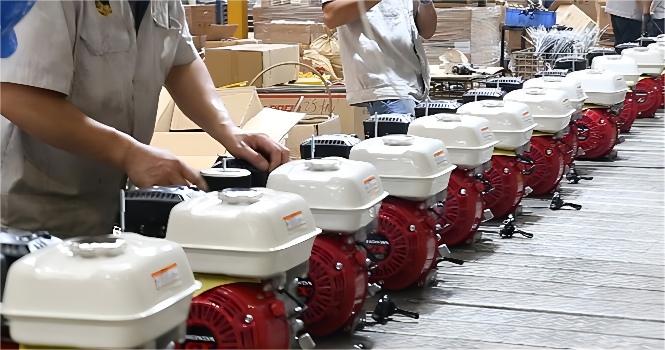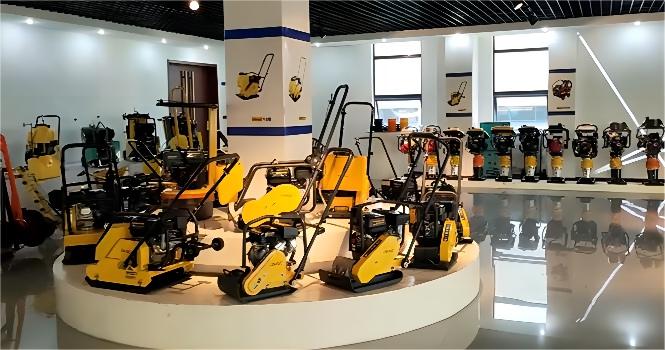Ground Compactor PME-C150
When you are looking for a plate compactor, we can assist you in selecting the most suitable compactor plate for your business.
Ground Compactor PME-C150
The PME-C150 Ground Compactor is a high-powered, durable solution designed for professionals tackling demanding compacting tasks. Powered by the reliable Loncin G200F engine, this compactor provides exceptional performance, making it ideal for large-scale projects requiring deep and effective soil compaction.
Superior Compaction Power
With a plate size of 63 cm x 40 cm, the PME-C150 delivers an impressive centrifugal force of 25 KN, allowing it to achieve a maximum compaction depth of 50 cm. Operating at a frequency of 4,300 VPM, this machine ensures thorough and efficient compaction, which is essential for projects such as road construction, landscaping, and hardscaping. Its travel speed of 20 meters per minute enables the compactor to cover up to 350 square meters per hour, providing reliable performance for time-sensitive projects.
Versatile and Adaptable
The PME-C150 is designed to handle a range of soil types, making it ideal for compacting both cohesive and granular materials. This versatility allows it to be used in a variety of applications, including driveways, pathways, and foundation work. Its compact design ensures easy maneuverability, and with a maximum inclination angle of 20°, it performs efficiently even on slopes and uneven surfaces.
Built to Endure
Constructed with high-quality materials, the PME-C150 is built for longevity and withstands the demands of rigorous use. Weighing in at a net weight of 140 kg and a gross weight of 130 kg, the machine is both robust and manageable. Packaged in a convenient size of 71 cm x 43 cm x 110 cm, it is easy to transport and store. The PME-C150 also includes a 1-year product warranty, offering peace of mind and reliable performance for professional contractors and dedicated DIYers tackling challenging compaction projects.
Applications
- Retaining Walls
- Footings and Foundation Projects
- Landscapes and hardscapes
- Patchwork on Asphalt
- Pipeline Applications
- Road Repair and Trenchwork
- Cohesive Soils and Granular Soils
- Sticky soils – such as clay or clayey silt
- Gravel, sand, silt, clay, or mixed soils
- Base, Subbase, Subgrade, Subsoil
- Backfill Pools, Parks, Cemeteries, and Golf Courses
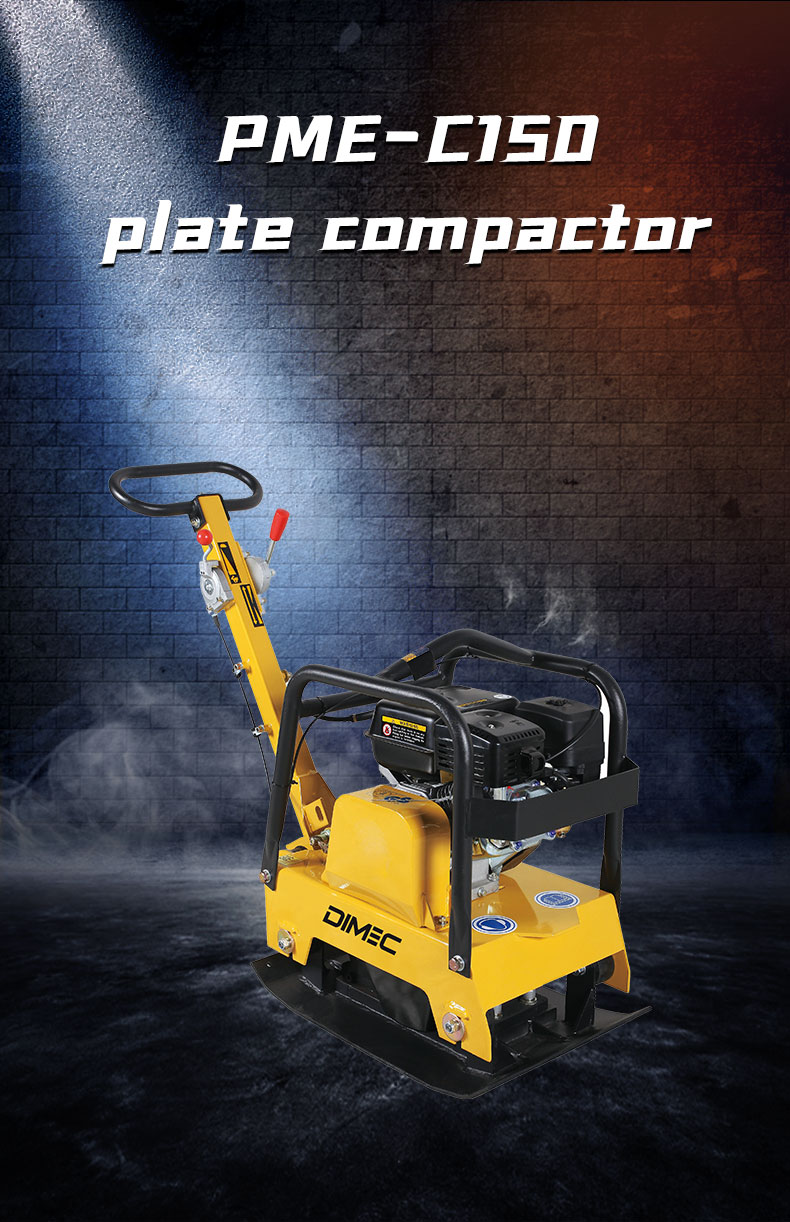
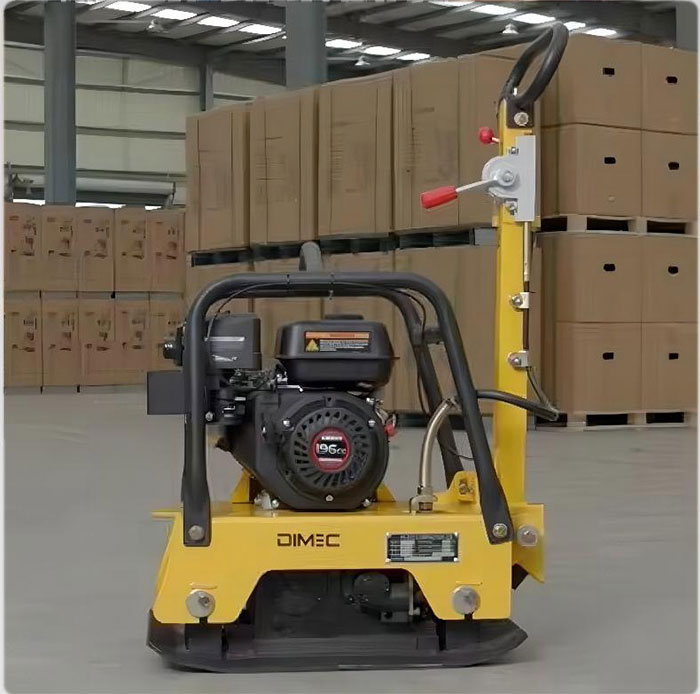
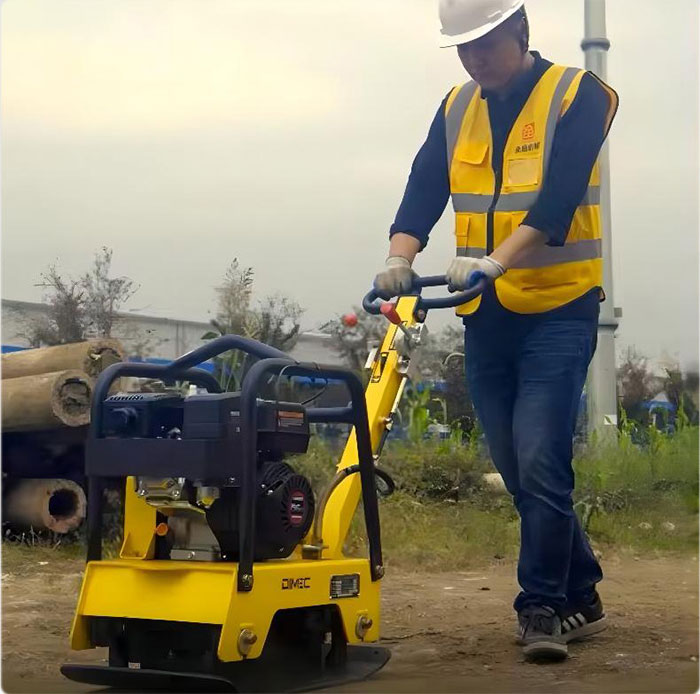
Key Specifications
| Model | Ground Compactor PME-C150 |
|---|---|
| Engine | Honda / Robin / Loncin / Diesel engine |
| Engine type | Air-cooled, single cylinder, 4-stroke, petrol engine / diesel engine |
| Frequency [VPM] | 4300 |
| Centrifugal force [KN] | 25 |
| Plate size (LxW) [cm] | 63x40 |
| Max.compaction depth[cm] | 50 |
| Travel speed [m/min] | 20 |
| Max.inclination angle | 20° |
| N.W./G.W. [kg] | 130/140 |
| Package (LxWxH) [cm] | 71x43x110 |
ADVANTAGE

Low vibration comfortable operation
Heavy-duty shock absorber system that effectively improves operating comfort by reducing shock to arms.
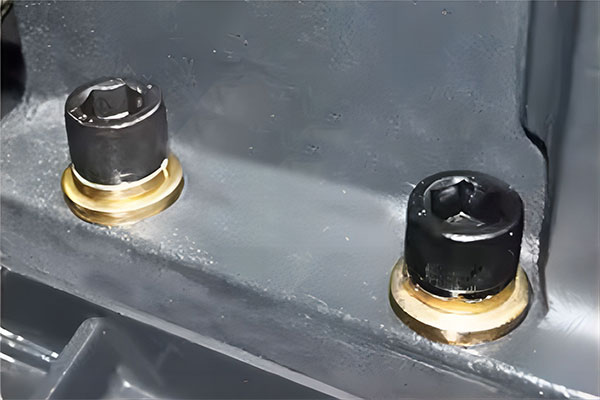
12.9 Grade bolts
High-strength bolts with exceptional durability, providing reliable fastening even under intense pressure and demanding conditions.

High strength engine frame
The material of thickened steel pipe has strong supporting force and stable gravity bearing capacity.

Strong power brand engine
Well-know brand engines Honda, Robin, Loncin low noise, low maintenance, low consumption.
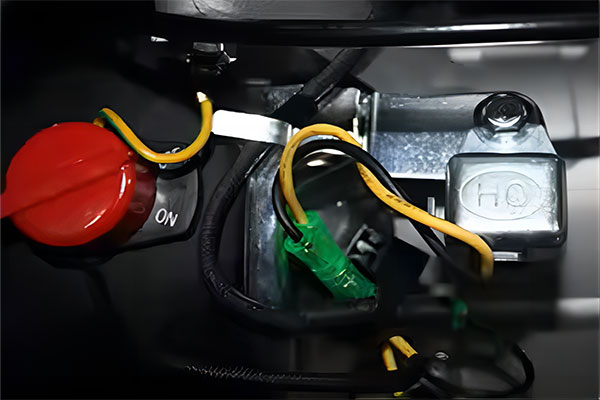
Low oil sensor
Advanced low oil sensor technology ensures automatic engine protection by preventing operation when oil levels are insufficient, extending engine life.

Professional spraying process
Utilizes advanced spraying techniques to deliver a smooth, even coating that resists wear, corrosion, and fading, ensuring long-lasting protection and aesthetic appeal.
QUESTIONS & ANSWERS
For small landscaping projects, a single-plate compactor is often the best choice due to its maneuverability and ease of use in tight spaces.
Ground compactors should be maintained regularly, with checks on fluid levels and part inspections every 50 hours of use or as specified by the manufacturer.
Using a compactor on excessively wet soil can lead to poor compaction results. It’s best to wait until the soil is damp but not waterlogged.
Yes, electric and battery-powered compactors offer eco-friendly alternatives with no emissions, making them suitable for environmentally conscious projects.
With proper maintenance, a high-quality ground compactor can last 10-15 years, depending on the frequency of use and the conditions it operates under.
Other Similar Products
20+ Years of Experience
Construction Machine Manufacturer
Professional manufacturer of small construction machinery, main products include plate compactor, tamping rammer, road roller,floor saw, concrete vibrator, generator etc.
Reversible Plate Compactor
A reversible plate compactor is a type of construction equipment specifically designed to compact and stabilize soil, gravel, sand, asphalt, and other granular materials. Unlike standard, forward-moving compactors, reversible plate compactors can move both forward and backward, allowing for greater maneuverability and efficiency, especially in confined or tight spaces.
Reversible plate compactors are essential tools for construction professionals who require efficient, versatile, and powerful compaction solutions. They enhance productivity, improve compaction quality, and provide greater control and ease of use in a wide range of applications.
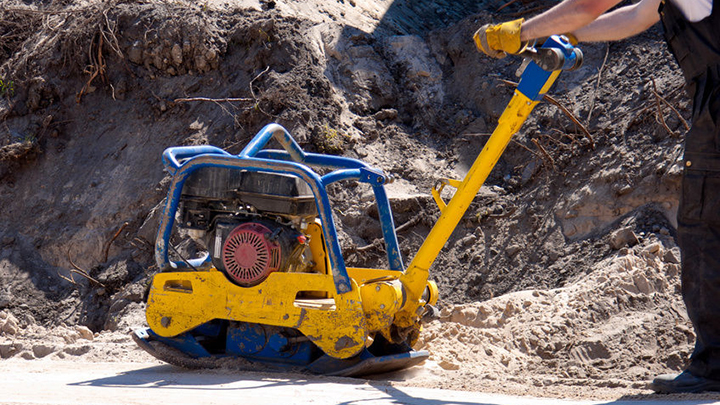
Ground Compactors: A Comprehensive Overview
In the world of construction and landscaping, ground compactors are indispensable tools, helping to create solid, level surfaces for a wide range of projects. Whether it’s road construction, landscaping, or foundation work, compacting the ground is essential for ensuring stability and durability. This guide will delve into what ground compactors are, the types available, how they work, and much more.
What is a Ground Compactor?
Definition and Purpose
A ground compactor is a machine designed to compress soil, gravel, sand, or asphalt. Its purpose is to increase the density of the ground surface, providing a stable foundation for construction work. By removing air pockets, compactors create a firm, uniform base that can withstand heavy loads and resist shifting over time.
Importance in Construction Projects
Ground compactors play a crucial role in construction projects by enhancing soil stability and preventing structural issues. Properly compacted ground reduces the risk of settling and erosion, which can lead to cracks, uneven surfaces, and even structural failure. Without compaction, projects may require more frequent repairs and maintenance.
Different Types of Ground Compactors
Plate Compactors
Plate compactors are versatile tools commonly used for small to medium-sized projects. They consist of a flat base plate that vibrates to compress the ground beneath it.
Single-Plate Compactors
These are designed for forward movement only, making them ideal for compacting sand and gravel in confined spaces.
Reversible Plate Compactors
Unlike single-plate compactors, reversible models can move forward and backward. They offer greater versatility and are suitable for larger areas and various soil types.
Rammer Compactors
Rammer compactors, also known as “jumping jacks,” are primarily used for cohesive soils like clay. They have a smaller footprint and apply more direct force, which makes them ideal for narrow trenches or areas with limited access.
Roller Compactors
Roller compactors are heavy-duty machines commonly used in road construction and large-scale projects.
Smooth-Wheeled Rollers
These rollers have smooth drums and are perfect for compacting granular soils and asphalt.
Padfoot Rollers
With raised pads or “feet” on the drum, padfoot rollers are well-suited for cohesive soils. The pads knead the soil, ensuring thorough compaction.
Pneumatic Rollers
These rollers have multiple rubber tires that provide a kneading action, making them ideal for compacting asphalt and granular soils.
How Ground Compactors Work
Vibration Mechanism
Most compactors use vibrations to increase soil density. The machine’s engine powers an eccentric weight that rotates, generating vibrations that are transmitted to the ground. This vibration causes soil particles to rearrange and settle tightly together.
Compaction Force and Frequency
Compaction force and frequency are essential for achieving optimal results. The force affects how deeply the compaction penetrates, while frequency (measured in vibrations per minute) influences how efficiently the soil particles are compacted.
Key Features of Ground Compactors
Power Source
Compactors can be powered by gasoline, diesel, or electricity. Diesel compactors are known for their durability and fuel efficiency, while electric models are quieter and produce no emissions.
Base Plate or Drum Size
The size of the base plate or drum determines the compactor’s coverage area. Larger plates and drums are more suitable for expansive projects, while smaller ones are ideal for confined spaces.
Frequency and Amplitude
The frequency determines how fast the plate or drum vibrates, while amplitude reflects the intensity of each vibration. Together, they affect the compactor’s ability to handle different soil types and project requirements.
Applications of Ground Compactors
Road Construction
In road construction, compactors are used to prepare the subbase and base layers, ensuring a smooth, stable surface for asphalt or concrete.
Landscaping Projects
Compactors are also valuable in landscaping, where they help to create level surfaces for patios, walkways, and retaining walls.
Foundation Preparation
For foundation work, compactors ensure that the ground can support the weight of structures, reducing the risk of settling and foundation cracks.
Choosing the Right Ground Compactor
Project Size and Scope
Consider the scale of your project when selecting a compactor. For smaller jobs, a plate compactor may suffice, while large projects may require a roller compactor.
Soil Type Considerations
Different soil types respond better to specific compactor types. Cohesive soils require rammers or padfoot rollers, while granular soils are best compacted with smooth-wheeled rollers or plate compactors.
Frequency of Use
If you plan to use the compactor frequently, invest in a high-quality model with a reliable engine and durable construction. Occasional users may find rental options more economical.
Safety Considerations When Using Ground Compactors
Proper Training
Operators should receive proper training on how to use the equipment, including how to start, stop, and operate the compactor safely.
Safety Gear
Always wear personal protective equipment (PPE), such as gloves, ear protection, and safety glasses, when operating compactors to reduce the risk of injury.
Regular Maintenance
Routine maintenance, such as checking fluid levels and inspecting parts, can prevent breakdowns and ensure safe operation.
Advantages of Using Ground Compactors
Enhanced Soil Stability
Compact soil is less likely to shift or settle, providing a stable foundation for construction.
Increased Project Efficiency
Compactors save time by reducing the number of passes required to achieve the desired soil density.
Cost Savings
By reducing the need for repairs and maintenance, compactors can lead to significant long-term savings on projects.
Common Mistakes to Avoid When Using Ground Compactors
Ignoring Soil Conditions
Different soils require different approaches to compaction. Failing to account for soil type can result in poor compaction and project failure.
Overuse of Compactor
Using a compactor on an overly compacted surface can damage the equipment and reduce its lifespan.
Neglecting Maintenance
Regular maintenance is essential to keep compactors in good working order. Neglecting maintenance can lead to costly repairs and downtime.
Top Brands in the Ground Compactor Market
Wacker Neuson
Wacker Neuson is renowned for its high-quality, durable compactors suitable for various applications.
BOMAG
BOMAG offers a wide range of compactors, known for their reliability and advanced features.
Caterpillar
Caterpillar compactors are ideal for heavy-duty applications, with a reputation for robust performance and durability.
Ground Compactor Maintenance Tips
Cleaning and Storage
Clean the compactor after each use to prevent dirt buildup and store it in a dry, sheltered area.
Regular Inspection
Inspect the compactor regularly for signs of wear, and replace any damaged or worn parts promptly.
Lubrication and Fluid Checks
Check the compactor’s fluid levels, such as oil and hydraulic fluid, to ensure smooth operation and prevent overheating.
Environmental Impact of Ground Compactors
Noise Pollution
Compactors can be loud, so it’s essential to consider noise control measures, especially in residential areas.
Fuel Consumption
Gasoline and diesel compactors produce emissions, so opting for fuel-efficient models or electric alternatives can reduce your environmental footprint.
Sustainable Practices
Using eco-friendly practices, such as renting rather than buying and opting for electric models, can make ground compaction more sustainable.
Future Trends in Ground Compactor Technology
Electric and Battery-Powered Models
Electric compactors are becoming more popular as they offer a quieter, emission-free alternative to traditional fuel-powered models.
Automation and Remote Operation
New technology is paving the way for remote-controlled and automated compactors, which can improve safety and efficiency.
Enhanced Durability and Efficiency
Manufacturers are focusing on making compactors more durable and energy-efficient to meet the demands of modern construction.
Conclusion
Ground compactors are essential tools in construction and landscaping, providing a stable foundation and improving the longevity of various projects. With different types to choose from, understanding how they work and what features to look for can help you select the best compactor for your needs. Remember to consider safety and environmental factors, and keep up with maintenance to get the most out of your equipment.
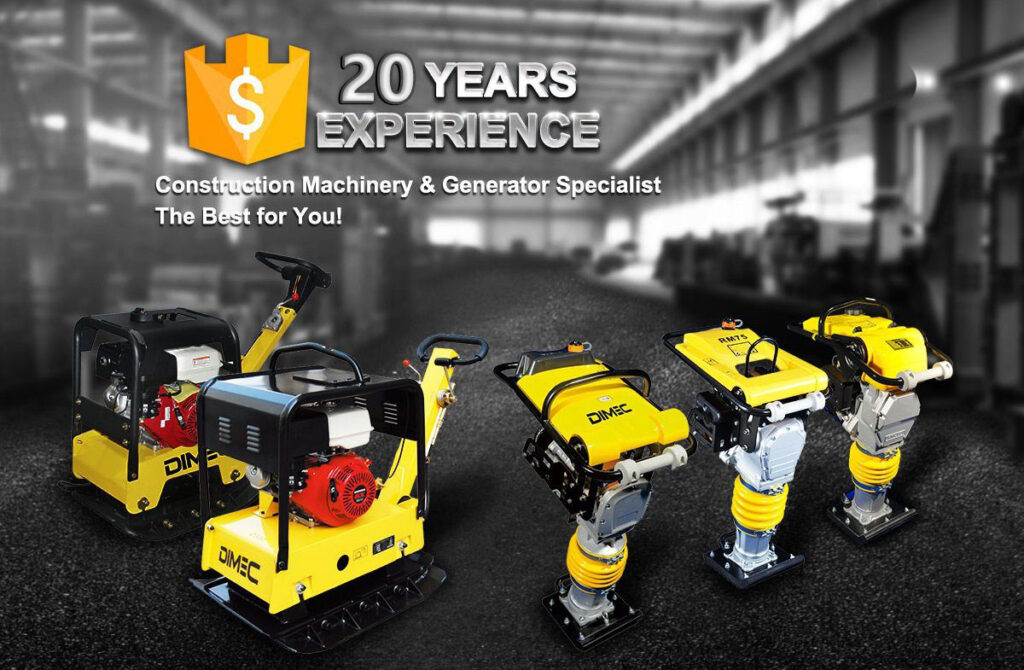
About Us
Wuxi Pinnacle Mechanical Equipment Co., Ltd. (PME) As a first-class specialty enterprise we serve global clients. PME specialize on production of plate compactor, tamping rammer, floor saw, concrete vibrator for global construction industry. We also produce engine, generator, and water pump. PME’s strengths are rooted from our strong team and rich resources.
We have complete production and assembly lines for different machines. There is a team of chief engineers, senior technicians and QC inspectors, equipped with a variety of finishing, spare parts inspection and product testing equipment, to safeguard production and innovation. Thus, we can control every step of production, from finish machining of spare parts, steel plate cutting and welding, spraying paint, all the way to product assembly. This results in effective product quality control.
With more than 20 years of exporting experience, PME has been exporting to over 68 countries and regions including North America, South America, Europe, Southeast Asia, Middle East, Africa. We also form strategic corporations with many multinational companies.
Factory Show
Let our expertise in custom Forward Plate Compactor take your projects to the next level.
Why Choose Us
Professional construction machinery manufacturer with OEM service
We are a leading manufacturer in the construction machinery industry, offering top-notch Original Equipment Manufacturer (OEM) services. Our commitment to innovation and precision engineering ensures that our machinery meets the specific needs of our clients, providing customized solutions that enhance efficiency and performance on the job site.
20 years production and exportation experience
With two decades of experience in production and exportation, we have built a strong reputation for delivering reliable and high-quality construction equipment worldwide. Our extensive knowledge and expertise in the industry enable us to understand the unique challenges of different markets, ensuring our products are tailored to meet global standards.
20+ types of construction site equipment are available for selection
We offer a diverse range of over 20 types of construction site equipment, catering to various industry needs. From heavy-duty machinery to specialized tools, our product lineup is designed to support every phase of construction, providing our clients with the flexibility to choose the right equipment for their projects.
10+ years QC monitor products quality
Our rigorous quality control processes have been refined over more than 10 years, ensuring that every piece of equipment we produce meets the highest standards. Our dedicated QC team meticulously monitors every stage of production, guaranteeing that our products deliver consistent performance and durability in the field.
8+ years experienced skilled workers
Our team comprises highly skilled workers with over 8 years of experience in the construction machinery industry. Their expertise and dedication are reflected in the precision and craftsmanship of our products, ensuring that every detail is executed to perfection.
8 workshops, 12 production lines
With 8 state-of-the-art workshops and 12 production lines, our manufacturing capabilities are designed to meet large-scale demands efficiently. Our advanced facilities allow us to maintain a streamlined production process, ensuring timely delivery of high-quality machinery to our clients around the world.
Unlock Superior Construction Efficiency with Our Expertly Engineered Machinery
Discover a world of advanced construction equipment tailored to meet the demands of modern job sites. With 20 years of industry experience and a commitment to quality, our machinery is designed to boost productivity and ensure reliability in every project. Explore our diverse range and experience the difference of precision-engineered solutions.




